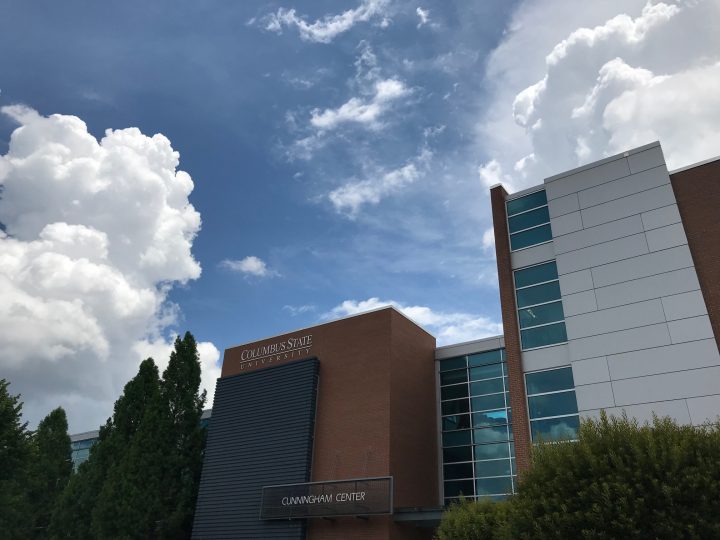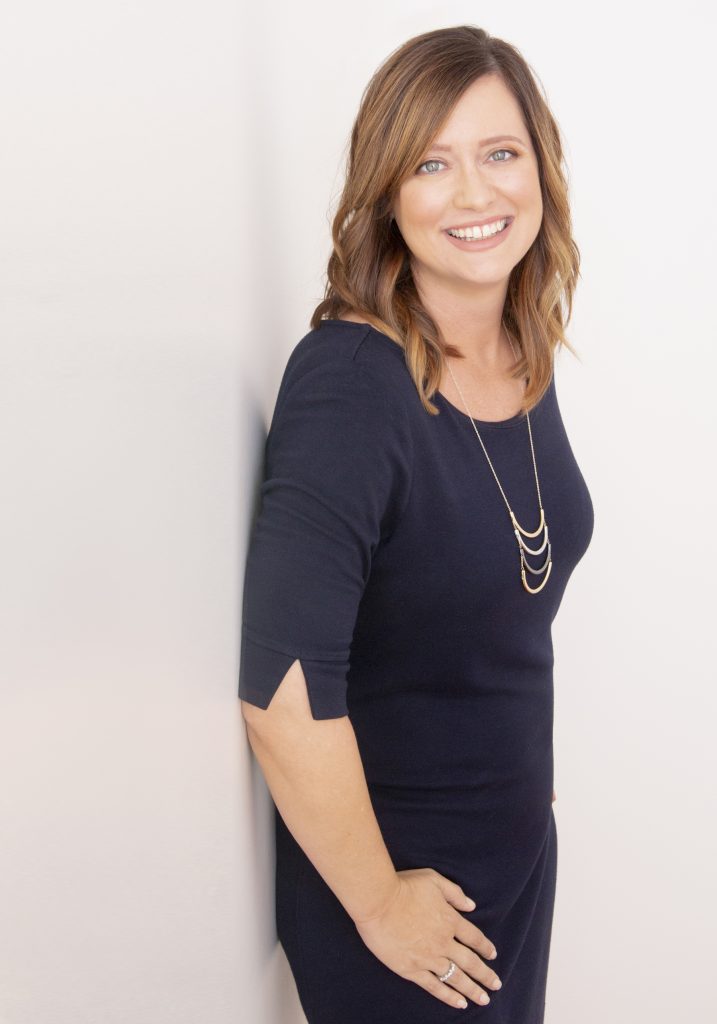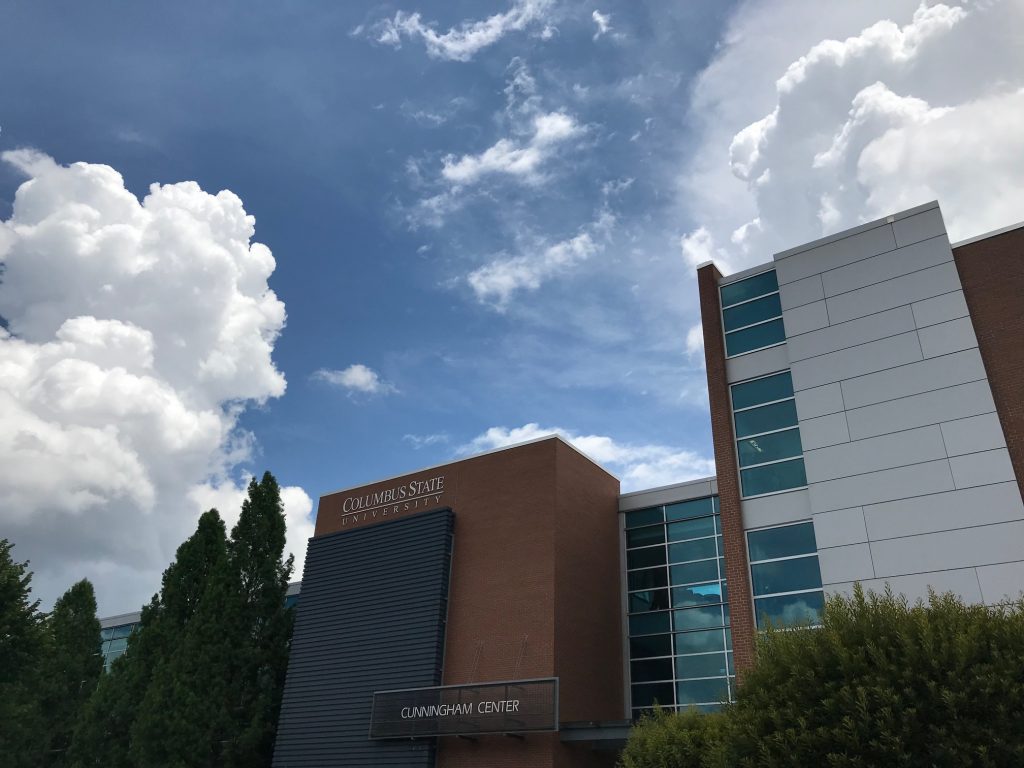
Executive Director, Leadership Institute at Columbus State University
Is a leader born? Or is a leader made?
“A leader is made. Absolutely.
If leaders weren’t made, we’d be out of business. Our whole premise is built on the fact that people can grow. We all have opportunities to do better—to be better—all the time. That’s really what leadership is all about: Being the best version of yourself you can be.”
What qualities constitute a good leader?
“For me, it’s somebody who genuinely cares about the people who work with them and work for them. Somebody ho understands that work is just one aspect of someone’s life and it shouldn’t be all consuming and, with that, the flexibility to allow people to have lives and understand that it’s an important part. And I think it’s somebody who gives people the autonomy or freedom to do the job they are there to do.”

Executive Director, Leadership Institute at Columbus State University
Photo by Shannon B. Whittington
What programs and services are offered at the Leadership Institute?
“We have 5 main service lines.
We provide leadership-development sessions, where we can come into your org and provide classes on particular topics of interest and tailor them to the needs your organization may have.
We do assessments. We use personality assessment tests such as DISC, Myers-Briggs, Emergenetics. We do 360 Degree leadership assessments so that you can get a lot of feedback on yourself from peers and co-workers—the people who have first-hand knowledge of what it’s like working with you.
We offer team-building activities. We partner with business all around the city to provide opportunities to go whitewater rafting and talk about the team-building opportunities that happen during and after that. We partner with the Escape Rooms in town for team-building activiti4es, as well.
We help lots of nonprofits and small businesses on strategic planning.
We offer Executive Coaching, where we work with clients one on one, try to help with them with improving their career, or changing their career, through sessions with our certified coaches. Executive Coaching is like work therapy; you come in and talk about your work life instead of your personal life.”
What has the Jim Blanchard Leadership Forum done for Columbus, Georgia?
“The mission of the Jim Blanchard Leadership Forum is to bring the best and brightest minds in the world to Columbus, Georgia. That is the primary mission.
Going into our 14th year, I think we’ve really been able to achieve that mission in making sure that we are brining the best and brightest at forefront of leadership and in their individual fields.
We bring in leaders who we feel people in the community would benefit to learn form. We keep it elbow-room intimate [1,200 attendees max] to make sure that, not only is the Forum a great opportunity to learn from them, but also great opportunity to get to meet them, You can shake their hand, get your book signed, and stand next to them in line for the bathroom.
How does the Institute fit into Columbus’ long-standing tradition of excellent civic leadership?
“We’re an excellent example of that tradition.
[U.S. Army Lt. Gen. (Ret.), former City Manager]] Carmen Cavezza is the one who started the Leadership Institute. His initial leadership and involvement got got this up and running in collaboration with Dr. Frank Brown, who was president of CSU for 30-plus years.Without the two of them being so civically minded and getting together and thinking the Institute was something the community wanted, and something the community needed, I don’t think the Institute would have been able to get off the ground as well as we did.
Now, we’re carrying on the torch.”
Tell us about the Disruptive Leadership Series.
“Back in October of last year, I had the opportunity to travel to Harvard to participate in a Sex and Power workshop for three days. People from all over the country came and really talked about what’s going on in the world sex and power and business.
It made me realize that we still don’t have the words, the language, the trust, to have these types of uncomfortable conversations.
When I came back, I talked about this with Jessica [Drake,Director of Marketing and Business Development] and Breana [Jones, Assistant Director of Client Experience and Market Research] and, after extensive focus-group studies and talking with community members and clients, we decided people here wanted—and were ready for—what we’re calling the Disruptive Leadership Series.
It’s called Disruptive in a positive way—we’re disrupting the old ways of doing things.
The first one we had was ‘Identity and Privilege’. Which was really cool; we had great, diverse community participation and people seemed to enjoy it.
On Tuesday, it’s Bystander Intervention. This conversation comes from the aspect of when someone at work does or says something inappropriate, when you’re like, ‘Hmmm….I don’t know about that.’ We’ll discuss when and how you can best do or say something in response.
In September, we’ll host a talk about Sex and Power in the workplace.
The series is important to what we do at the Institute because we need to all take a step back and look at all the changes in our world today. There’s about to be a big change in the way we’re going to lead people in the future. We need to be thinking about it now and talking it about now.”

Education: Media Studies, Valdosta State University, Master’s of Communication, Auburn University
Favorite restaurant: Caffe Amici
Best concert you’ve attended: Sleigh Bells at the Tabernacle in Atlanta
Leader in your own life that you admire: “When I was in college, I had a professor named Jen. Her leadership style—the way she taught—is that she would sit with you while you painfully figured it out. We had to do a lot of editing in Media Studies. She would be emotionally supportive, but she’s not going to do it for you. And soon you figured it out, she’d say, ‘Okay, you can teach that to the class tomorrow.’
That made a huge impact on me and is a big part of what I carry over and teach here. You can be a manager of people without being a leader. Being a leader means taking the time, effort, and energy to make somebody as good as you—or even better than you— and having that compassion and patience to be able to do it.
Learning how to do something on our own showing others how to do it is what we think the crux of what leadership is. Developing other leaders is what leaders do.”

